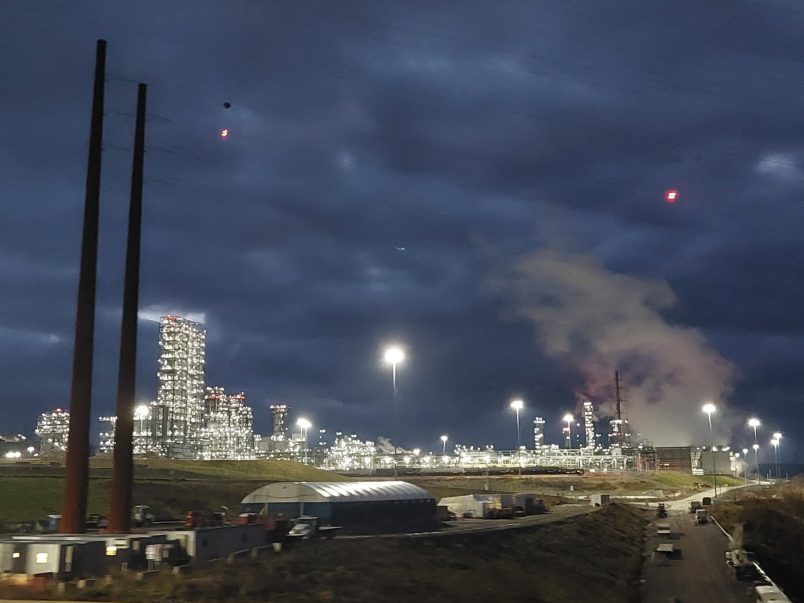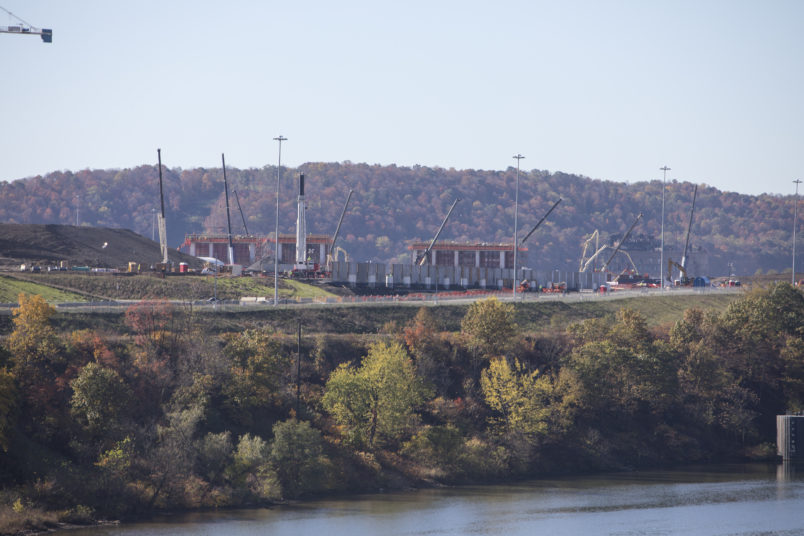From the car window, drivers on Pennsylvania route 18 can see smoke billow from the stacks of the Shell Polymers Monaca plant in Beaver County.
It’s taken a decade to get to this point, but Shell’s new plastics plant near Pittsburgh is now open.
This new facility will turn ethane, a natural gas component, from nearby fracking operations and process — or “crack” — it into 1.6 million metric tons of plastic in the form of tiny pellets every year, which will mainly be used to make new single-use plastic packaging.
“This plant is the largest investment in Pennsylvania since the mid-century and one of the largest of its kind in North America,” Hilary Mercer, senior vice president of Shell Polymers, wrote in a November Facebook post.
Pennsylvania’s fracking boom more than a decade ago initially attracted Shell to the area. The state sits atop the Marcellus and Utica Shale gas reserves.
Shell officials and some in Pennsylvania’s government are optimistic that the plant in Beaver County could be the first of many, ushering a wave of petrochemical facilities to the region. The company’s leadership has described dreams of opening other polyethylene plants that would use the gas reserves to feed a booming Appalachian plastics manufacturing industry.
The prospect represents something of a lifeline for the industry. Major oil companies like Shell and ExxonMobile are rapidly increasing their plastics output to make up for the anticipated shrinking demand for the companies’ fossil fuel products as nations lean on renewables and electrify their economies. Plastics are projected to be a key source of income for Big Oil over the coming decades — and these companies are using these projections to justify building new plants to crank out more.
“What’s happening in the power plant sector? We’re slowly shifting to cleaner renewables, so less demand for fossil fuel for electricity,” said Judith Enck, a former EPA regional administrator under the Obama Administration and the founder of the group Beyond Plastics, a project based at Bennington College in Vermont. “What’s happening in transportation? People are buying electric cars, big truck fleets are electrifying, less demand for fossil fuels for transportation.”

While Pennsylvania hopes to be the titan of plastic, United Nations members agreed in March to create the world’s first international plastics treaty by 2024 to curb plastic production. By 2030, plastic will emit more greenhouse gases than coal-fired power plants, according to a 2021 study by Beyond Plastics.
Prior to the Shell plant opening, the Gulf Coast region was America’s hub for ethane cracker plants. But Chad Newton, deputy communications manager with the Pennsylvania Department of Community and Economic Development, said bringing one of these facilities to Beaver County is a “game changer” because it will “open the door for the entire petrochemical industry to develop.”
A significant portion of the plastics manufacturing sector in the United States and Canada — 73 percent — is within 700 miles of Shell’s plant, according to a 2017 IHS Markit study, and could be invigorated by it.
In this way, the plant’s impact is projected to stretch past Pennsylvania. If the plant is profitable, more like it will follow and expand the market for plastic at a time when the Earth is on the brink of climate disaster.
Pennsylvania Gets Cracking
While the success of the fossil fuel industry’s pivot to plastic, and the environmental implications that will come with it, are to some extent still unknown, the impacts on the communities where these plants are built have been shifting starkly into focus.
The facilities are typically located in areas facing economic hardship or where there are people from underrepresented backgrounds, and are at times lured there by government incentives.
In the case of Beaver County, Shell was encouraged to build the plant through various local and state tax breaks, including a $1.65 billion tax credit to start in 2017 and continue for 25 years. It was the largest state subsidy ever.
“I can tell you, with hand to my heart, that without these incentives we would not have made this investment decision,” Ate Visser, former vice president of Appalachia petrochemicals at Shell Chemical LP, said in 2016.
Then-Governor Tom Corbett (R), who pushed through the tax credit for Shell, gave the company the greenlight to build the plant without telling local officials, who learned of the news along with other residents.
“They did this without thinking,” said David Passmore, a retired economics professor at Penn State University who’s been studying the Shell plant’s economic impact on the region for years. “They presume benefits. In many cases, the decisions are being made by people who don’t understand the mechanics of how their economy works.”
State and local tax breaks for private companies rarely boost economic growth, Passmore said. He believes the same will be true for the Shell plant.

A Shell-funded study by Robert Morris University, which only looked at the plant’s benefits, found that the plant would result in $3.7 billion annually in statewide economic impact. The study also predicted Pennsylvania would get $23 million each year in income taxes, though the project’s receiving $66 million a year in tax credits.
Shell did not reply to numerous requests for comment for this article.
Construction on the 386-acre plant began in 2017 on the site of the Horsehead Corporation zinc smelter facility. On top of the tax reduction package, state lawmakers also agreed to pay to clean up the waste from this hazardous site.
The debate is ongoing about whether the plant will be an economic boom or an environmental bust, and how to weigh the two possibilities against one another.
Former President Donald Trump toured the plant while it was under construction in 2019. He told workers at the time that the plant would never have happened without him.
“We hope Shell is going to be building a number of others, but we’ve made it a lot easier for them,” Trump told a crowd of plant employees (ignoring the fact that Shell announced plans to build the plant in 2012 under the Obama Administration). “It would’ve been very tough without what we’ve been able to do.”

From Steel Country To Plastic Country?
Beaver County’s economy has been dependent on polluting industries — and the booms and busts that come with them — for decades. First steel production, then fracking.
“People’s hopes and dreams have been, at least for the last 10 years, so tied to this plant on false premises,” said Terrie Baumgardner, a Beaver County resident and outreach coordinator of the nonprofit group Clean Air Council. “All that people hear sometimes is the word jobs.”
For that reason, Baumgardner said, it’s been difficult to talk with residents about the health impacts of the Shell plant.
Now that the facility has become operational, it’s expected to employ 600 permanent workers. It is permitted by the Pennsylvania Department of Environmental Protection to release up to 159 tons of fine particulate matter and 522 tons of volatile organic compounds every year, making the plant the state’s second biggest polluter.
Heavy exposure to these pollutants is linked to respiratory illness, cancer and cardiovascular disease and could compound health problems for people with asthma and lung cancer.
That means in Beaver County alone at least 41,856 people would be affected, according to the American Lung Association.
Shell has assured residents that the plant will be safe.
“Protecting the community and environment is our top priority,” said Kim Kaal, Shell Polymers environmental manager, during a virtual public meeting about the plant in May. “Protecting the environment is key to maintaining our license to operate.”
For Baumgardner, these assurances do little to allay concerns.
“We have the river valleys here and that’s going to trap that pollution,” said Baumgardner. “And it’s as if nobody considered that in the planning of this thing.”
Alison Steele, the executive director of the Environmental Health Project, produced models before the Shell plant opened to show how pollution from the site would disperse throughout the area.
“There’s an incredibly high probability of the pollutants sitting in the river valleys,” said Steele. “There’s no good place to put up a petrochemical facility, but a river valley is not a good one. We’re already seeing water pollution from the site itself, we’re seeing air pollution, we’re also seeing, you know, light and sound pollution and those are stressors as well for people living near these types of facilities.”
Shell’s plant opened on Nov. 15 with little fanfare. The plant’s expected to be fully operational by the second half of next year. Community environmental groups have prepared for this day for years. They’ve created a network of citizen air monitors around the plant.
“You need to let the citizens know in real time: Do they need to evacuate or should they shelter in place? Not tell them a month later,” said Dr. Clifford Lau, an adjunct professor of chemistry at Duquesne University who is working with the citizen air monitoring initiative called Eyes on Shell.
As part of a 2015 settlement with environmental groups, Shell agreed to install and operate fenceline monitors at the plant to monitor emissions.
The company promised residents that data from the monitors would be publicly available on an easily accessible website, but Baumgardner noted during a November meeting of Eyes on Shell that the form in which it is released — tables listing the concentration of various pollutants — is not necessarily helpful to the plant’s neighbors.
“Shell has posted fenceline monitoring data going beyond what is legally required and posting it early online,” she said. “The data that’s been posted is not accessible to or at least understandable by the average person.”

That’s a big concern for some residents because the plant has already had a number of problems.
Residents from around Beaver County live under the nighttime glow of the plant’s artificial lights. So, when the lights dim or change colors, they take notice.
Less than two weeks after the plant opened, an orange glow appeared in the sky around the facility.
That night, Shell posted a statement on its Facebook page that an issue with a steam generator prompted the company to activate its ground flare system and burn off excess hydrocarbons flowing through a malfunctioning piece of equipment, which resulted in the orange glow. Shell reported that the flare itself is not a malfunction but, instead, a “safety device.”
In August, white foam was found near the plant in the Ohio River. Shell later said it was likely caused by a combination of cleaning agents.
Before that, in March, at least 2,000 gallons of sulfuric acid spilled at the plant because of faulty equipment. Shell later said the spill was “fully contained and created no off-site impacts.”
Some residents learned about the accident through notifications from a national alert system.
Bill Watson, Shell Polymer’s general manager, said at a virtual meeting in May that the company will post notifications to the public on the Shell Pennsylvania Chemicals Facebook page.
Last September, residents in and around Beaver County reported a nauseating chemical smell resembling maple syrup.
Pennsylvania’s Department of Environmental Protection issued Shell a notice of violation of the company’s air permit and sections of the Air Pollution Control Act for the odor and an unrelated cloud of dust from construction activities that blew outside of the plant’s property line.
Since 2015, the Shell plant has violated the state DEP’s environmental health and safety regulations at least 21 times, according to the agency.
Baumgardner said people have also found tiny pellets of plastic in the river near the plant; he believes this is a warning sign of more plastic pollution in the near future.
Shell’s plant converts ethane into ethylene and polyethylene pellets that are about the size of a pea. When these plastic bits are transported onto trains and trucks they can spill and wind up in waterways and on shorelines.
The company has said they’ve built multiple barriers to capture any plastics that may spill at the plant and have joined Operation Clean Sweep, an industry program to reduce plastic pellet pollution.
Chad Newton, deputy communications manager with the Pennsylvania Department of Community and Economic Development, said the plastic pellets are regulated under the state’s Clean Streams Law and Solid Waste Management Act.
Newton added that Shell is trying to minimize the risk of plastic pellets getting into waterways by treating stormwater from the site before it’s discharged and plans to include a storm water collection system to prevent pollution.
TPM sent Shell detailed questions about the ways the company was ensuring the plant is safe for nearby communities, including how residents will be alerted in the event of an emergency and unsafe air pollution levels, as well as the ways the company was ensuring its plastic pellets won’t enter into nearby waterways. Numerous representatives and departments at Shell were contacted over several weeks for comment on this story, none of whom responded.
Lau and other members of Eyes on Shell want to empower residents to collect emissions data and monitor the air quality around the plant. They hope this information can be used during the public comment period for Shell’s Title V permit application.
Soon, Shell will need to apply to Pennsylvania’s DEP and the EPA for the Title V permit, which sets emission levels for certain hazardous air pollutants. The permit would allow the plant to operate for the next five years.
“People shouldn’t let their guard down just because now that the plant is up,” said Lau. “This is prime time that we need to be most diligent and watching them and collecting as much data as we can about what they’re actually emitting.”







Of course he did. He’s not a member of the Guardians Of Polluters for nothin’.
Missing from this chart — a photo of Tom Corbett (R).
Weasels don’t deserve that. You will pay.
Are we supposed to be opposed to this plant because we don’t like petrochemical companies or because the State of Pennsylvania seems to have been rolled by Shell? Plants like this have to exist somewhere and Pennsylvania is as good a place as any. From what I read in the article the state was rolled in the usual way. Tax breaks and easy regulation in exchange for permanent jobs in an economically depressed area. The company told the state that without the tax breaks and easy regulation they would locate the plant somewhere else. Where have we heard that before? How about every time a large company proposes building a plant. What Shell did was follow the standard playbook to squeeze as much out of state and local government as possible.
These companies should be required to:
Period. They should NOT be allowed to expand until they have implemented these steps.
These fossil fuel companies are a cancer upon the world.